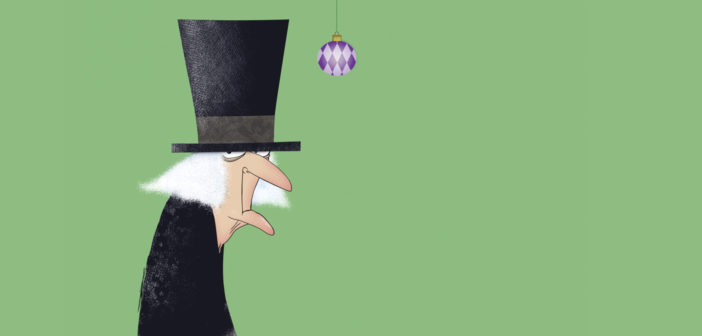Ebenezer Scrooge is an infamous Christmas villain. However, looking at him through an economic lens shows that he is, actually, a productive member of society who gets a bad rap.
Scrooge owns a money-lending business. “Money-lending” has an unfair connotation, as Scrooge is just running a bank and issuing loans. Banking plays a crucial role in the economy, allowing individuals and businesses to buy items that would otherwise require years of saving to purchase. Unlike a bank, Scrooge is not taking in deposits to fund these loans. Instead, he is issuing these loans out of his own personal fortune. This type of lending is inherently more stable than the modern factional reserve banking system.
Since modern banks use deposits to issue loans, they are susceptible to “bank runs” in which many depositors demand to withdraw their money at once. Since the bank used these funds to make loans, the bank does not have enough cash on hand to meet this demand and subsequently, fails. A bank failure can touch-off additional bank failures, as we saw during the Great Depression, when one-third of the banks in the United States failed. Since a failed bank currently gets bailed-out by the Federal Deposit Insurance Corporation (FDIC), banks also have incentive to issue risky loans to poor credit risks.
Since he is lending money out of his personal fortune, Scrooge has incentive to issue high quality loans to good credit risks. Should a loan be defaulted on, Scrooge would lose his own money, not depositors’ or taxpayers’ money through the FDIC. Since Scrooge is not taking in deposits, he faces no risk of a bank run.
Scrooge is charged with overworking and underpaying his clerk, Bob Cratchit. These are baseless charges. Dickens writes that Cratchit is paid 15 schillings a week for a 60-hour workweek, which is a slightly below-average workweek during the Victorian-era at an above-average wage. If Cratchit was indeed underpaid, he could have taken a job at a different bank for higher pay. Cratchit enjoyed better working conditions than a common Victorian-era laborer, who faced dangerous conditions working in mines, factories, sweeping chimneys and so forth. Cratchit’s biggest complaints are that he has an impersonal boss and the office is cold.
Scrooge is described as a miser who doesn’t like people, again baseless charges. Had he squandered his fortune on consumption goods or given it away to the poor, he would have no funds available to lend. The Ghost of Christmas Past showed that Scrooge had a difficult childhood. His cold father sent him to a boarding school, where he was friendless and picked-on by the other students. Thus, it’s no surprise that the adult Scrooge prefers to keep to himself. We should show him some compassion when he makes snarky comments, sending poor people on the street to workhouses when they hit him up for money.
Entrepreneurs like Scrooge play a vital role in the economy! He would be commended, not condemned, by the Ghost of Christmas Future.














